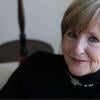
There’s personal history behind one of the pieces in Inna Faliks’s repertoire. The Ukrainian American pianist, who was born in Odessa and immigrated to the U.S. as a young girl, remembers the sheet music she packed for that trip decades ago. “The folder of compositions I worked on with Freidlin was one of the objects I carried in my backpack through immigration,” she says.
It’s not those pieces, however, but rather the man who encouraged them that the pianist is thinking about. Jan Freidlin was Faliks’s composition teacher when she was growing up in Odessa; he would emigrate himself soon after his student left. Happily, the two reunited years later in Israel, and Freidlin wrote a work for the occasion, Ballade in Black and White, which Faliks would premiere at Carnegie Hall in 2011 and record for her 2017 album, Polonaise-fantasie: The Story of a Pianist.

“Playing it takes me back to Odessa, in a way, to that musty apartment and those magical, very intense composition lessons,” she says. “It’s always been my dream to go back to the city of my birth, and for the foreseeable future, that looks impossible. I have never been back.”
Faliks will reprise Ballade in Black and White as part of a program this Sunday (May 1) at Culver City’s Robert Frost Auditorium. A handful of prominent Ukrainian classical musicians in the Los Angeles area are coming together for a “Concert in Solidarity With Ukraine,” presented by two local performance series, Jacaranda and Music at the Wende. Tickets are free, though reservations are required and a minimum donation is suggested.
“All of the music chosen for this concert carries a lot of meaning,” says violinist Myroslava Khomik. She sees a shared story across the selections and singles out Myroslav Skoryk’s Melody as the unifying piece on the program. “Written under a different chapter of oppression in Ukraine, by a composer who himself suffered early in life from Stalinist deeds, it is more relevant than ever and has become the second anthem of Ukrainian people.”
Antonio Lysy, who will perform a movement from Dmitri Shostakovich’s Cello Sonata, echoes the sentiment. He cites the Soviet composer’s “musical protests of the autocratic system he experienced” as another all too timely example, “in solidarity with the suffering in Ukraine.”
This gets at the heart of the program and suggests how a concert can have a larger purpose. Yes, Sunday’s performance will be raising funds for Direct Relief, which is providing medical aid for victims of the Russian-led war in Ukraine — not something to overlook.

But the artists are also making an impact in what they’re choosing to present. Jacaranda’s artistic director, Patrick Scott, has curated music that brings out the Ukrainian connection for composers not always thought of that way, from Sergei Prokofiev to the more obscure Reinhold Glière. The team at the Wende Museum has selected art and poetry to accompany the program, giving a more complete picture of the country’s cultural heritage.
Plenty of non-Ukrainian musicians — pianist Steven Vanhauwert, Jacaranda’s resident ensemble the Lyris Quartet — will be taking the stage as well, in support of their colleagues.
Khomik sums up what it means to her. “When I moved to the U.S. as a young student, I slowly came to the realization that there was very little presence and knowledge about Ukraine in the West,” she says. “I’d love to emphasize how much Ukrainian people appreciate this kind of support from around the world today. It makes me very proud to have Los Angeles musicians stand together.”




